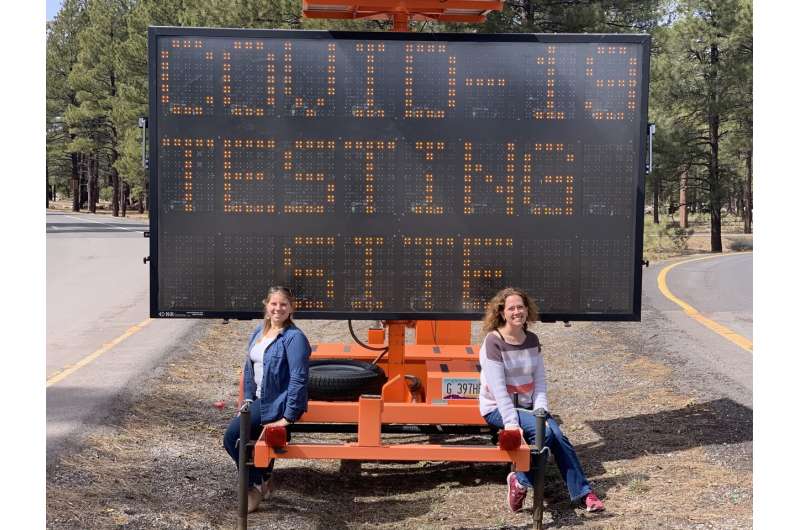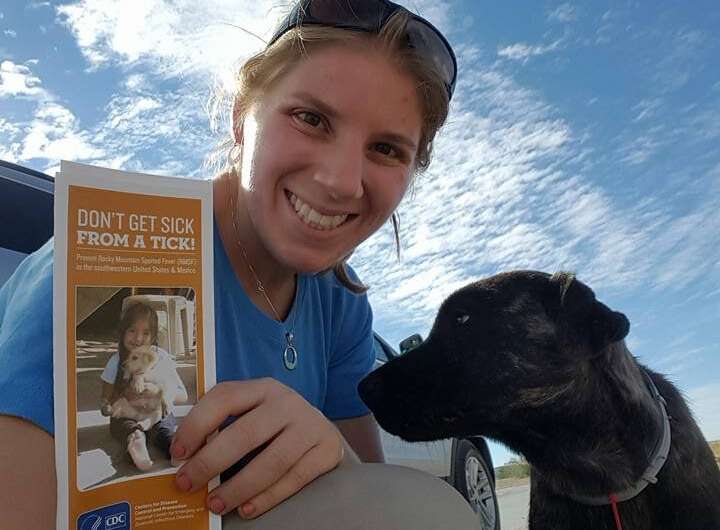Unraveling the genetic mysteries of infectious disease

As a genomics epidemiologist, Hayley Yaglom is currently studying the transmission patterns of COVID-19 and working to support Arizona communities with testing for the virus. After earning a bachelor's degree in animal science and a master's degree in animal biotechnology, both from the University of Massachusetts, she came to Mizzou in 2011 for her Master of Veterinary Public Health.
"I've always had a passion for science and medicine, especially when it comes to the health of animals and humans," said Yaglom, who is originally from Long Island, New York.
During the three years she spent at Mizzou, Yaglom gained valuable experience at the MU Research Center for Human-Animal Interaction coordinating research studies and community programs that focused on the health benefits of the human-animal bond with Rebecca Johnson, professor emerita in the College of Veterinary Medicine. Her highlights include working with the Puppies for Parole program, which provides selected offenders in Missouri prisons the opportunity to train rescue dogs, as well as coordinating a study to investigate the benefits of therapeutic horseback riding for veterans with post-traumatic stress disorder.
"I had the opportunity to collaborate with different agencies across Missouri and learned vital skills related to grant writing, research implementation, data organization and management, and the communication of scientific data," Yaglom said. "My experiences at Mizzou gave me the foundation to dive into a career in public health, and also rooted my interests in One Health, the intersection of human, animal and environmental health."
After graduating from MU, Yaglom worked for the Arizona Department of Health Services as a senior vector-borne and zoonotic disease epidemiologist. Yaglom worked largely with tribal communities to combat the public health threat of Rocky Mountain spotted fever, a disease spread by a tick bite.
Now a genomics epidemiologist for the Translational Genomics Research Institute (TGen), a non-profit research agency in Flagstaff, Arizona, Yaglom is using her experiences with infectious diseases to better understand the novel coronavirus causing COVID-19.

"Our team is conducting whole genome sequencing of positive samples to better understand the genomic epidemiology of this virus," Yaglom said. "By looking at the genetic code of the virus, we can see the origin of each sample, track different strains and examine how it is spreading across the population."
TGen has already tested more than 1,000 patients for COVID-19 since March. Serving as their communications lead for the COVID-19 response and the partner management coordinator for their clinical laboratory, Yaglom recently earned the institute's "Hero of the Week" for her collaboration with public health, health care partners and tribal communities.
Outside of the COVID-19 response, Yaglom serves as TGen's One Health genomics epidemiologist. New technologies can be used to address problems at the human, animal, and environmental intersection through detection of emerging pathogens, tracking of disease outbreaks and antimicrobial resistance in microbial populations.
"Our vision is to have the research we conduct be translational for clinical medicine and public health," Yaglom said.
Yaglom is also an active adjunct faculty member with the MU Master of Public Health program.
"What I will always carry with me from Mizzou is that it takes a team of dedicated people from diverse backgrounds to make great science and response work happen," Yaglom said. "When it comes to emerging pathogens, such as COVID-19, there are new things to learn every day. By working with people from public health, health care, nonprofit, governmental, academic, environmental and animal health agencies, we can accomplish something truly impactful."
Provided by University of Missouri





















